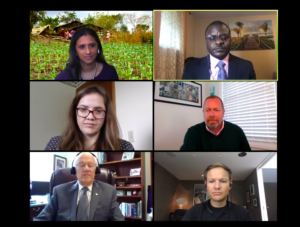To learn more about Digital Green’s AI-powered platform and how it impacts small-scale farmers in India, Ethiopia, Kenya, Nigeria and Brazil, we encourage you to sign up for our newsletter.
A Youthful Vision of the Future of Food

This week as the world celebrates World Food Day and International Day of Rural Women, the global community will come together to collectively focus our attention on strategies to achieve zero hunger by 2030. We’ll highlight the challenge of climate change, revel at the promise and possibilities of new technologies, and again remind ourselves of the urgency if we are to sustainably nourish a population of 9.7 billion by mid-century. But some very important actors will largely not be part of these conversations: the children and youth that will be shouldering these burdens and marshaling solutions in the decades to come, when many of us have stepped back. Of course, engaging youth in agriculture isn’t just something to plan for in the future, it’s something we need to do to meet today’s challenges. In sub-Saharan Africa where the population will double by 2050, there are already an estimated 12 million new jobs needed per year to absorb the new entrants to the job market. So what do we do to go beyond the rhetoric of inspiring and including youth to actually engaging them and employing them to create solutions?
Today we have a new resource to help us: I have the pleasure of announcing the launch of a much-awaited report from the Feed the Future Developing Local Extension Capacity (DLEC) project entitled: “Engaging Young Agripreneurs: Options to Include Youth in Private Sector Extension and Advisory Services in Rwanda and Uganda”. This study reviewed 37 initiatives engaging youth across extension and advisory services (EAS), both as providers and as recipients of these services. These included a range of models including agripreneurship training, internships, paraprofessional services, fee-based services and financial services. The report contains rich analysis and 10 key recommendations to achieve better outcomes when engaging youth. Some highlights include: appreciating the diversity of approaches to engagement and their unique contributions, encouraging a supportive policy enabling environment and recognizing and designing for the diversity of needs and experiences contained within the ‘youth’ category (often spanning 15-25+).
While this report focuses on employment and opportunity, some argue we should begin even earlier when it comes to  including youth. Yesterday, I moderated a panel, on the sidelines of the World Food Prize, focused on school-based agriculture education and panelists discussed plans to spark a movement to increase access to this engaging, exciting and unique approach to learning. The methodology discussed at this event, modeled after the Future Farmers of America, has been adapted and adopted in several locations throughout the world. It not only focuses on the ‘hard skills’ and science of agriculture, which is often brought back home to the farm, but also the ‘soft skills’, like leadership, preparing young people to succeed in the future, whatever they pursue.
including youth. Yesterday, I moderated a panel, on the sidelines of the World Food Prize, focused on school-based agriculture education and panelists discussed plans to spark a movement to increase access to this engaging, exciting and unique approach to learning. The methodology discussed at this event, modeled after the Future Farmers of America, has been adapted and adopted in several locations throughout the world. It not only focuses on the ‘hard skills’ and science of agriculture, which is often brought back home to the farm, but also the ‘soft skills’, like leadership, preparing young people to succeed in the future, whatever they pursue.
What is clear is that more holistic, coordinated and deliberate inclusion of youth is needed in the decision-making shaping our future food system. We need the energy, youthful proclivity to adopt technology and try new things, and so many other talents of young people to meet the rising challenges we’re all facing.
If you’d like to read more about youth in extension or explore the broader body of work of DLEC, check out the DLEC project page here and on Agrilinks.